This new Vancouver city council is going to run out of topics to discuss if this torrid pace continues.
They’re on a tear.
Two weeks ago, Mayor Kennedy Stewart and councillors introduced no less than 10 motions of notice in their first full week of public meetings.
Topics included the opioid crisis, social housing, a renters’ office, a city-wide plan, the budget and protecting tenants from “renovictions” and aggressive buy-outs. More than 100 people registered to speak to council that week, the majority on the renovictions motion, which was put over until Dec. 4 for a vote.
This week, there’s another 10 motions before council.
Topics include the mayor’s call for conflict-of-interest rules related to elected officials and staff, the creation of a lobbyist registry and a review of the mayor’s office budget.
There are motions requesting support for the B.C. Poverty Reduction Coalition’s plan to reduce poverty, the need for more child care, a bylaw change related to ride-hailing and a few motions involving taxes.
As of Monday, a total of 43 people were registered to speak to these motions.
The majority—22—will be in the council chamber to address NPA Coun. Rebecca Bligh’s motion to seek a “proposed alternative to provincial encroachment on the City of Vancouver’s municipal tax base.”
Bligh’s motion requests the mayor write a letter to Premier John Horgan, Green leader Andrew Weaver and Liberal leader Andrew Wilkinson to withdraw the proposed tax that targets residents whose homes are assessed at $3 million or more.
She suggests the province use other tax-generating options such as “the progressive income tax system” to fund the B.C. budget. As readers may recall, the so-called school tax—which is supposed to be effective next year—sparked several protests earlier this year.
Frankly, I’m surprised only 22 speakers signed up.
That’s this week.
Next week, on Dec. 11, council will hear from city staff on the $1.5 billion operating budget. Council will also consider $371 million for new capital projects.
City staff has proposed a 4.9 per cent property tax increase. It was 4.24 per cent last year, and 3.9 per cent the previous year.
Council will decide at it Dec. 18 meeting on the increase, which city staff say is being driven largely by costs to “cover inflationary and wage costs of existing services, and new investments to maintain and improve services.”
In other words, police officers and firefighters are getting salary and benefit increases. In fact, this year, public safety wage increases climbed 2.5 per cent, a rate higher than inflation.
As I wrote in a previous piece, the arbitrated settlement between the Vancouver Police Union and the Vancouver Police Board will expire at the end of this year, “adding uncertainty and additional cost pressures for future years,” according to budget documents.
But the new council’s pace is not unprecedented.
The same week Gregor Robertson and his Vision team of candidates were sworn in to office back in December 2008, they opened homeless shelters and dumped then-city manager Judy Rogers, who was replaced by Penny Ballem, who has since been replaced by Sadhu Johnston.
Those actions were followed by a succession of motions introduced on topics related to building affordable rental housing, creating a mental health plan, amending the Residential Tenancy Act to help renters and creating a bike lane on the Burrard Bridge.
Interestingly, then-councillor Tim Stevenson introduced a motion way back on Dec. 16, 2008 calling for the city to use its own Standards of Maintenance bylaw to repair buildings and charge costs to the owner.
That was 10 years ago.
My research shows the city has done minor repairs on buildings and billed owners, but never a complete renovation.
For years, the bylaw has been referred to by housing activists when dilapidated single-room-occupancy hotels such as the Balmoral and Regent in the Downtown Eastside are discussed. One of those housing activists, Jean Swanson, is now a city councillor.
I predict another motion, but likely not this week.
The Balmoral and Regent, meanwhile, remain closed while the city and the hotels’ owners battle over the city’s desire to expropriate the properties, which have been notorious for disrepair and crime for decades.
Tomorrow’s council meeting begins at 9:30 a.m.
@Howellings



